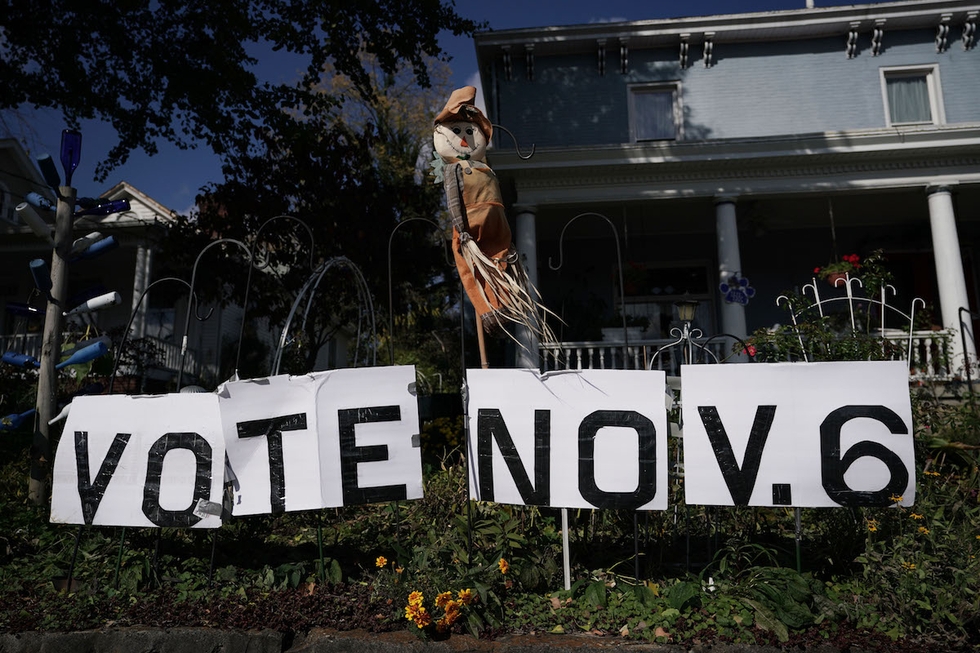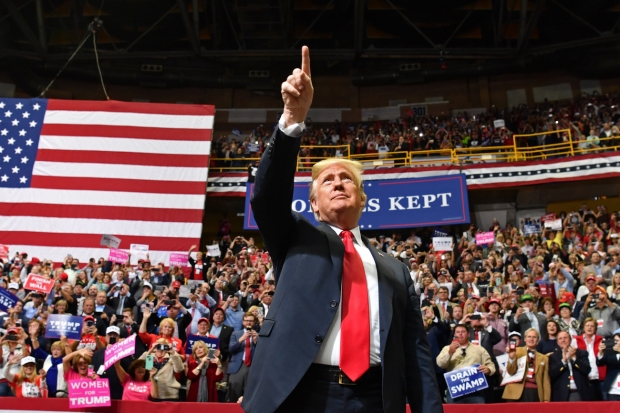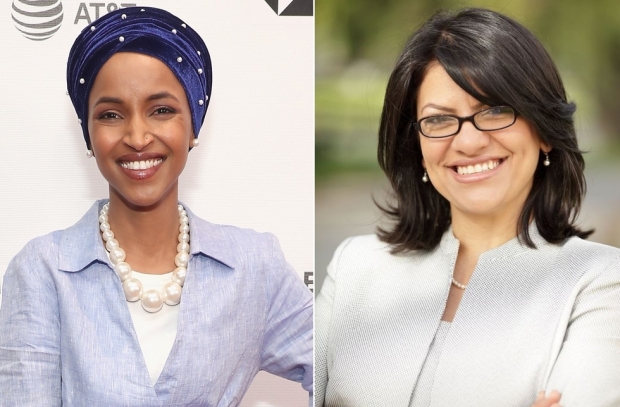Everything you need to know about US midterm elections

After a months-long campaign that has been denounced for stoking xenophobia and hate, the US midterm elections are nearly here.
Millions of Americans will head out to cast their ballots on Tuesday, as 435 seats in the US House of Representatives and 35 Senate seats are up for grabs.
Held at the midway point of the US president's four-year term, the midterms offer a chance to shake things up in Washington, as both chambers of the US Congress are currently held by Donald Trump's Republican party.
This year, the results will largely be seen as a reflection of how voters view Trump's performance to date.
The president has been touring the country in the lead-up to the vote, hoping to shore up support for Republicans in key races.
He has also tried to stave off widespread criticism that his rhetoric and policies have stoked xenophobia, far-right extremism, and a string of racially motivated attacks, including a deadly shooting at a Pittsburgh synagogue last month.
Here are the races to watch, the issues that matter most, and what's at stake in the midterms.
First though, what's up for grabs?
All 435 seats in the House of Representatives are being contested, while 35 seats in the 100-member Senate are at stake. US voters will also choose new governors in 36 states.
Republicans, who currently have a slim 51-49 hold on the Senate, are likely to remain in control there, according to the latest polls.
Democrats have said they believe they can retake control of the House, which they lost in 2010, but to do it, they'll need a net gain of 23 seats.
What are some of the key issues?
Without a doubt, the midterms are being seen as a litmus test for the president and his policies.
Trump has used what many say is divisive and xenophobic rhetoric in the lead-up to Tuesday's vote. Last month, he routinely vilified a caravan of migrants heading toward the US, describing it as an "invasion".
He also alleged that "criminals and unknown Middle Easterners" were among the migrants, a claim that was denounced as racist.
The president has long been accused of stoking hatred as he courts white nationalists in the US.
In the aftermath of a deadly shooting at a Pittsburgh synagogue in late October, a progressive Jewish group asked him not to visit the city until he denounced such views; Trump went to Pittsburgh, anyway.
Last week, Trump released a racially charged campaign ad featuring an undocumented Mexican immigrant in court bragging about killing two police officers.
Trump's critics say the ad is a part of his effort to stir racial anxieties.
The ad was deemed so controversial that even right-wing news network Fox News decided to stop to airing it, AFP reported on Monday.
NBC and Facebook pulled the ad as well.
For Democratic Party supporters and anyone opposed to the positions of the president and his Republican colleagues, the midterms are a chance to try to regain some control over US policies and keep the president in check, at least domestically.
Could this be a historic election?
It very well could be, as two Democratic Party candidates are expected to become the first Muslim women elected to Congress on Tuesday.
Rashida Tlaib of Michigan and Ilhan Omar of Minnesota are running in safe Democratic districts.
Up until last week, Tlaib was running unopposed because Republicans didn't field a candidate to challenge her. But Detroit City Council President Brenda Jones, whom Tlaib defeated in the Democratic primaries in August, will be running as an independent.
Jones' name will not appear on the ballot, however, so voters who favour her must write her name in themselves, making her chances of winning minimal.
Tlaib is the daughter of Palestinian immigrants, while Omar came to the US as a refugee from Somalia, and their victories in Democratic primaries were hailed as symbolically important earlier this year.
"This really pushes back against the narrative that Arabs, Muslims and immigrants are a threat to us rather than a part of us," Sally Howell, an Arab-American studies professor at the University of Michigan-Dearborn, told MEE in August.
What are some other races to watch?
Texas Senator Ted Cruz has been in a surprisingly competitive race against rising Democratic star Beto O'Rourke, but most polls have predicted that the Republican senator will retain his seat.
Cruz was among dozens of candidates named in a recent report for having used anti-Muslim rhetoric in their campaigns. “We’ve called Cruz out on his statements about surveying Muslim communities,” Sobia Siddiqui, from the Houston, Texas, branch of the Council on American-Islamic Relations, told MEE last month.
Cruz, who ran for president in 2016, is one of the most fierce advocates for Israel in Congress and he was one of the most outspoken backers of Trump's decision to move the US embassy to Jerusalem. Last month, he rebuked O'Rourke for accepting donations from liberal Jewish group J-Street, calling the organisation "rabidly anti-Israel".
Cruz also introduced a bill last year aiming to designate the Muslim Brotherhood a terrorist organisation, but his attempts to blacklist the political Islamist group have failed so far.
Two races for governor have also drawn attention nationally.
In Georgia, Democrat Stacey Abrams is seeking to become the first black woman to be elected governor of a US state. Her campaign has gained widespread support, including from Oprah Winfrey, who went out onto the campaign trail to publicly back her last week.
Meanwhile, in Florida, Andrew Gillum, the mayor of the state capital, Tallahassee, is in a hard-fought battle against a Trump acolyte, Republican Ron DeSantis.
A clip of Gillum debating DeSantis went viral last month after the Democrat said his Republican challenger is backed by neo-Nazis. "I'm not calling Mr DeSantis a racist; I'm simply saying the racists believe he's a racist," Gillum said.
Ammar Campa-Najjar is running for Congress in San Diego, California. He was chastised in Israeli media earlier this year for being the grandson of a Palestine Liberation Organization (PLO) leader. His grandfather, Muhammad Youssef al-Najjar, was assassinated by the Israeli Mossad in 1973 in Lebanon.
Congressman Duncan Hunter, Campa-Najjar's Republican opponent, is facing federal charges of using campaign funds for personal expenses. Hunter has made thinly veiled, racist attacks against the Democratic candidate, baselessly accusing Campa-Najjar of "working to infiltrate Congress" and receiving support from the Muslim Brotherhood.
"Hunter’s tactics against his opponent are deplorable, but they are not entirely surprising, given the success of other candidates who opportunistically stoked passions against minorities and portrayed them as a threat, including President Trump during his presidential campaign," the Arab American Institute wrote in a letter to the Republican National Committee last month.
Will any of this affect US foreign policy?
That's up for debate, though typically, while their domestic policies may differ slightly, both Democrats and Republicans have pursued equally hawkish ones abroad.
One of the key places the midterm results may have an impact on is the Senate Foreign Relations Committee, which is currently chaired by Republican Senator Bob Corker, who decided to retire from the Senate at the end of the year.
Corker has been one of the most vocal critics of the US president and his relationships with the leaders of Saudi Arabia. In fact, Corker is among a group of US senators and congresspeople who have called for US sanctions on Riyadh over the murder of journalist Jamal Khashoggi.
If Republicans retain their majority in the Senate, as they are expected to, it's likely that Republican Senator Jim Risch will succeed Corker as the head of the committee.
Risch was recently described in The Hill as "a Trump loyalist who will be much more likely to defend the president next year".
That could signal a rollback of recent efforts to hold the Trump administration accountable for its policies in the Middle East, including questions over US ties to Saudi Crown Prince Mohammed bin Salman in the wake of the Khashoggi case.
"Americans rarely vote on foreign policy, and certainly issues from healthcare to jobs and immigration are on the ballot in bold font, looming far larger than America’s place in the world," David E Wade, former chief of staff at the US Department of State, wrote in a column published by Reuters on Monday.
"But the outcome will nonetheless set the stage for how Trump navigates the next two years of his presidency, both among voters and international leaders."
Middle East Eye propose une couverture et une analyse indépendantes et incomparables du Moyen-Orient, de l’Afrique du Nord et d’autres régions du monde. Pour en savoir plus sur la reprise de ce contenu et les frais qui s’appliquent, veuillez remplir ce formulaire [en anglais]. Pour en savoir plus sur MEE, cliquez ici [en anglais].






